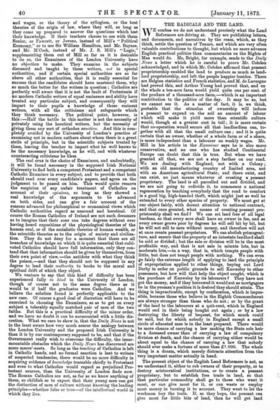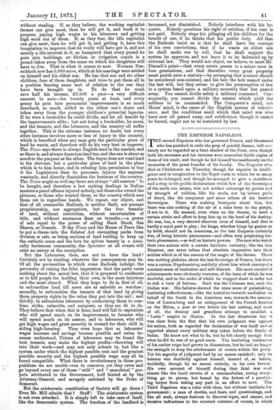THE RADICALS AND THE LAND.
\TE confess we do not understand precisely what the Land V Reformers are driving at. They are publishing letters, and documents, and narratives by the ream, which, as they think, settle the question of Tenure, and which are very often valuable contributions to thought, but which no more advance English practical politics than commentaries on the Rights of Man would do. Mr. Bright, for example, sends to the Daily News a letter which he is careful to prove Mr. Cobden acknowledged, and in which Mr. Cobden affirmed that peasant proprietorship enabled the land to produce as much as land- lord proprietorship, and left the people happier besides. There are Belgian statistics and French statistics, and M. de Lavergne had proved this, and Arthur Young had proved that, and on the whole a ten-acre farm would yield quite one per cent. of the produce of a thousand-acre farm,—which is an important contribution to the politics of the day. It may be so, but we cannot see it. As a matter of fact, it is, we think, probable that the stimulus of ownership will induce a peasant to expend on the soil an amount of labour which will make it yield more than scientific culture would, though at a greater cost in toil ; it is more certain that co-operation would secure all that landlordism can, to- gether with all that the small culture can ; and it is quite certain that an owner, whether of .a whole farm or of a share, is more independent than a labourer on weekly wages. Mr. Mill in his article in the Examiner says he is also more conservative, and no one who has studied Continental Europe can doubt that this is true. But when we have granted all that, we are not a step farther on our road. We are dealing with England, not with a Colony ; with an old manufacturing country of limited area, not with an American agricultural State; and there exist, and can exist, no just means whatever of creating a peasant proprietary. The land is all parcelled out and divided, and we are not going to redivide it, to commence a national regeneration by teaching everybody that the road to comfort is a good big, high-handed theft, which might just as well be extended to every other species of property. We must get at our object fairly, with decent attention to national contract, and that once granted, what means of creating peasant pro- prietorship shall we find ? We can set land free of all legal burdens, so that every acre shall have an owner in fee, and as every owner grows poor by degrees he will sell bit by bit, but
he will not sell to men without money, and therefore will not at once create peasant proprietors. We can abolish primogeni- ture, and ensure that the property of an intestate landlord shall be sold or divided ; but the sale or division will be in the most profitable way, and that is not sale in minute lots, but in moderate lots,—in a way, that is, which tempts people with little, but does not tempt people with nothing. We can even go fairly the extreme length of applying to land the principle of expropriation applied to other things, buying out Lord Derby in order on public grounds to sell Knowsley to other possessors, but how will that help the object sought, which is the purchase of Knowsley by its labourers ? They have not got the money, and if they borrowed it would not as mortgagors be in the yeoman's position it is desired they should attain. The thing is impracticable, except by confiscation, which is impos- sible, because those who believe in the Eighth Commandment are always stronger than those who do not ; or by the grant of the land to the labourers at a quit-rent, which in England would end in their being bought out again ; or by a law destroying the liberty of bequest, for which much could be said, but for which nobody in England except a small circle of educated men is in the least prepared. There would be more chance of carrying a law making the State sole heir to a deceased owner than of carrying a law of compulsory division at death, and the chance of carrying either would be about equal to the chance of carrying a law that nobody
should ever make a fortune of more than £1 000. The whole thing is a dream, which merely distracts attention from the very important matter actually in hand.
The present object of the English Land Reformers is not, as we understand it, either to rob owners of their property, or to destroy aristocratical institutions, or to create a peasant proprietary, but to establish free trade in land, so that that particular commodity shall go to those who want it most, or can give most for it, or can waste or employ most money in turning it to account. They want to let the workman buy the tools. If, as they hope, the peasant can give most for little bits of land, then he will get land
without stealing. If, as they believe, the working capitalist farmer can give most, then he will get it, and work it to purpose, paying high wages to his labourers and getting high work out of them. If, as they fear, the idle capitalist can give most, then he will get it, and getting it, have this temptation to improve, that he really will have got it, and not merely a life-interest in it, so hampered that every pound he puts into buildings, or ditches, or irrigation canals is a pound taken away from the sums on which his daughters will have to live. That is what it comes to now. Norman Pen- ruddock now has 5,000 acres, which at his marriage were settled on himself and his eldest son. He has that son and six other children, four of them daughters, and tries to put them all in a position bearing some sort of relation to the one they have been brought up in. To do that he must save half his income, £3,500 a year—a very difficult amount to save—for twenty years at least, and every penny he puts into permanent improvements is so much drawback, so much added to the eldest son's share and taken away from the younger children's potential legacies. If he were a freeholder he could divide, and let all benefit by the improvements alike ; but not being a freeholder, he saves, and the tenants, and the labourers, and the country all suffer together. This is the extreme instance, no doubt, but every other instance involves more or less of injury to the country, which is benefited when any man gets the particular piece of land he wants, and therefore will do his very best to improve. The Times says there is always English land in the market, and so there is, and always Arnim lean land too, and the one is about as much to the purpose as the other. The buyer does not want land in the abstract, but a particular piece of land in the place which is to him home, and in refusing him permission to buy it the Legislature fines its possessor, injures the aspirant wantonly, and directly diminishes the business of the country. The Times might as well say there are always " old masters " to be bought, and therefore a law making dealings in Italian masters a penal offence injured nobody, not thosewho owned the pictures, or those who wanted them, or the country which sees them rot in regardless hands. We repeat, our object, and that of all reasonable Radicals, is neither theft, nor peasant proprietorship, nor aggregation, but the free transfer of land, without restriction, without uncertainties of title, and without enormous fines on transfer,—a power of sale, equal to the power of selling Bank Stock, Gas Shares, or Consols. If the Times and the House of Peers like to put a clause into the Estates' Act exempting parks from division or sale, as being sections of land tending., to keep up the aesthetic sense and the love for sylvan beauty in a natu- rally barbarous community, the Spectator at all events will raise no outcry at the exemption.
But the Labourers, then, are not to have the land ? Certainly not by stealing, whatever the consequences may be. Of all the perversities in which some Radicals indulge, the perversity of raising the false impression that the party cares nothing about the moral law, that it is prepared to confiscate or to kill people for holding their own, is the moat injurious and the most absurd. What they hope to do is, first of all, to enfranchise land till acres are as saleable as watches ; secondly, to enfranchise the tenants of that land by giving them property rights in the value they put into the soil ; and thirdly; to enfranchise labourers by authorising them to com- bine, strike, subscribe, and emigrate, as they see fit to do. They believe that when this is done, land will fall to capitalists who will spend much on its improvement, to farmers who will spend much on its usance, and to labourers, who will get high wages and great security in reward for their skill in aiding high-farming. They even hope that as labourers' wages increase and savings become possible and union be- comes understood, Unions of labourers may be found the best tenants, may make the highest profits—throwing will into their work—and may not only submit to, but like a system under which the highest possible rent and the greatest possible security and the highest possible wage may all be found compatible. What there is revolutionary in those pro- positions we are unable even to conceive, yet they cover and go beyond every one of those " wild " and " anarchical " pro- jects attributed to the Government, half hinted at by the Attorney-General, and savagely satirised by the Duke of Somerset.
But the aristocratic constitution of Society will go down I Even Mr. Mill admits that ? Stuff I The aristocratic system is not even attacked. It is simply left to take care of itself, like the democratic system. The freedom of the landlord is increased, not diminished. Nobody interferes with his be- quests. Nobody questions his right of eviction, if his rent is not paid. Nobody stops his pillaging all his children for the benefit of one, if he thinks that his public duty. All that the Radicals insist on is that he shall have the courage of his own convictions, that if he wants an eldest son he shall make one by will, that he shall support the system he approves, and not leave it to be bolstered up by external law. They would not object, we believe, to meet Mr. Disraeli's point—that every estate passes to a minor once in four generations, and that therefore every great property must perish once a century—by arranging that a minor should be considered non-existent, and his heir the heir named under the last will, but they refuse to give the presumption of law to a system based upon a military necessity that has passed away. You cannot divide safely a military command. Con- sequently, you cannot divide the estates which yield the soldiers to be commanded. The Conqueror's mind, not Moses' mind, is the cause of the English system of inherit- ance, and the conditions amid which that mind was wise have now all passed away, and subdivision, though it cannot be forced, ought not to be restricted by law.



































 Previous page
Previous page